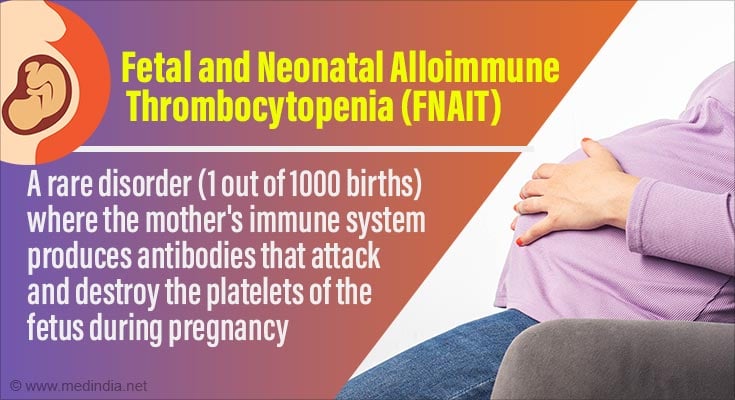This immune response can lead to low platelet levels in the fetus, causing bleeding and potential complications. While most cases are mild, severe instances can result in
.
, against fetal platelet antigens. Notably, there are 24 known human platelet-specific alloantigen (HPAs), with anti-HPA-1a being the most common in white populations. The timing and mechanism of immunization remain uncertain, but interactions between the maternal immune system and fetal cells, particularly trophoblasts, are considered crucial (
).
Recognizing FMAIT can be challenging, but suspicion arises if neonatal thrombocytopenia is incidentally discovered or if there’s a family history of the condition. The clinical presentation varies based on the severity and onset of thrombocytopenia. Bleeding into the skin, often manifesting as petechiae or ecchymoses, is a common sign. Severe cases may involve bleeding into major organs, emphasizing the critical need for early diagnosis.
Difference between Autoimmune and Alloimmune Thrombocytopenia
Neonatal thrombocytopenia is relatively rare, and FMAIT stands out as the most common cause of severe cases. Distinguishing it from other conditions like infection, autoimmune thrombocytopenia, or genetic abnormalities is crucial for effective management. FMAIT differs from autoimmune thrombocytopenia as it exclusively affects fetal platelets due to maternal antibodies, leading to more severe manifestations.
Advertisement
Autoimmune thrombocytopenia is caused by the immune system mistakenly recognizing platelets as foreign and producing antibodies against them. These antibodies then target and destroy platelets, leading to a low platelet count. This condition can occur in both children (immune thrombocytopenic purpura) and adults (immune thrombocytopenia) and is often idiopathic, meaning the exact cause is unknown.
On the other hand, alloimmune thrombocytopenia occurs when a pregnant woman’s immune system produces antibodies against her baby’s platelets. This can happen if there is a mismatch between the mother’s and baby’s blood types, specifically in the ABO or Rh system. These antibodies can cross the placenta and destroy the baby’s platelets, leading to thrombocytopenia in the newborn.
Challenges in Assessing FMAIT’s Impact
Assessing the severity of FMAIT poses challenges, and currently, there is no definitive maternal laboratory marker for predicting outcomes. A history of a previously affected child remains the most robust predictor of recurrence and severity. Maternal antibody titers may not consistently correlate with clinical severity, emphasizing the need for close monitoring and individualized assessments.
While universal screening for FMAIT is not currently recommended, various approaches have been suggested to identify pregnancies at risk. Screening strategies involve measuring circulating anti-HPA antibodies or using genotyping techniques. However, the lack of a simple, safe, and validated screening test complicates the decision-making process.
Prenatal and Neonatal Management: Balancing Risks and Benefits
Managing pregnancies at risk for FMAIT involves careful planning, with a focus on avoiding complications. Maternal intravenous immunoglobulin (IVIG), corticosteroids, or intrauterine platelet transfusions are potential treatments, each with its own set of considerations. Neonatal management centers around platelet transfusions, with the goal of maintaining adequate platelet levels and minimizing the risk of bleeding.
FMAIT remains a complex and challenging condition that requires a multidisciplinary approach for effective management. While advancements in screening and treatment strategies continue, a nuanced understanding of the condition’s intricacies is essential for improving outcomes and reducing the impact of this rare but serious pregnancy complication.
References :
- Fetal and Neonatal Alloimmune Thrombocytopenia – (https://www.ncbi.nlm.nih.gov/pmc/articles/PMC3651544/)
- Fetal/neonatal alloimmune thrombocytopenia: a systematic review of impact of HLA-DRB3*01:01 on fetal/neonatal outcome – (https://ashpublications.org/bloodadvances/article/4/14/3368/461573/Fetal-neonatal-alloimmune-thrombocytopenia-a)
Source: Medindia



